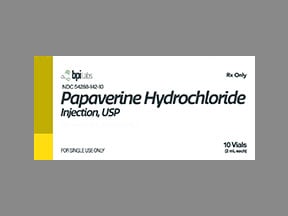
Papaverine Coupons & Savings Card – Discount Prices from $19.94
Papaverine is a vasodilator medication that relaxes smooth muscles in blood vessels, leading to their dilation and improved blood flow. It is used to treat various conditions involving smooth muscle spasms, such as certain types of chest pain, circulation problems, and disorders of the stomach or gallbladder. Papaverine is available in different forms, including tablets, extended-release capsules, and injections. When taken orally, the tablet is usually administered three to five times a day, while the extended-release capsule is typically taken every 8 to 12 hours. It's important to follow the prescribed dosage and not to crush, chew, or divide the extended-release capsules. Papaverine should not be used to treat erectile dysfunction, as improper use can lead to serious complications, including painful or prolonged erections that may require medical intervention. Common side effects may include dizziness, bruising or bleeding at the injection site, and mild burning along the penis when injected. Patients should consult their healthcare provider for personalized advice and report any adverse effects promptly.
Our coupons are free to use. Before paying, show the pharmacist your Papaverine savings card to get your free discount. Use our filters below to edit the prescription box to match your needs. The Papaverine prices will update based on your prescription needs. Above our Papaverine coupons, you can change your location to see pharmacy prices and costs in other areas. We're here to help you buy Papaverine at the lowest price with our prescription discount card.
My prescription
Edit
2ML of 30MG/ML, Papaverine (1 Vial)
Select pharmacy

CVS
$48.71
COUPON PRICE
Walmart
$19.94
COUPON PRICE
Walgreens
$25.74
COUPON PRICE
Albertsons
$39.15
COUPON PRICEPapaverine savings card
Show this card to your pharmacist
Walmart
$19.94
BIN
ID
PCN
GRP
019876
LH9133D0AE
CHIPPO
LHX
Powered by
Papaverine is a vasodilator medication that relaxes smooth muscles in blood vessels, leading to their dilation and improved blood flow. It is used to treat various conditions involving smooth muscle spasms, such as certain types of chest pain, circulation problems, and disorders of the stomach or gallbladder. Papaverine is available in different forms, including tablets, extended-release capsules, and injections. When taken orally, the tablet is usually administered three to five times a day, while the extended-release capsule is typically taken every 8 to 12 hours. It's important to follow the prescribed dosage and not to crush, chew, or divide the extended-release capsules. Papaverine should not be used to treat erectile dysfunction, as improper use can lead to serious complications, including painful or prolonged erections that may require medical intervention. Common side effects may include dizziness, bruising or bleeding at the injection site, and mild burning along the penis when injected. Patients should consult their healthcare provider for personalized advice and report any adverse effects promptly.
Our coupons are free to use. Before paying, show the pharmacist your Papaverine savings card to get your free discount. Use our filters below to edit the prescription box to match your needs. The Papaverine prices will update based on your prescription needs. Above our Papaverine coupons, you can change your location to see pharmacy prices and costs in other areas. We're here to help you buy Papaverine at the lowest price with our prescription discount card.
Papaverine dosage forms
Use our Papaverine 2ML of 30MG/ML coupon with prices from $19.94 for 1 Vial. You can also use our Papaverine 2ML of 30MG/ML coupon with prices from $58.86 for 2 Vials. We have a Papaverine 2ML of 30MG/ML coupon with prices from $93.21 for 3 Vials.
Dosage Quantity Price from Per unit 2ML of 30MG/ML 1 Vial $19.94 $19.94 2ML of 30MG/ML 2 Vials $58.86 $29.43 2ML of 30MG/ML 3 Vials $93.21 $31.07
| Dosage | Quantity | Price from | Per unit |
|---|---|---|---|
| 2ML of 30MG/ML | 1 Vial | $19.94 | $19.94 |
| 2ML of 30MG/ML | 2 Vials | $58.86 | $29.43 |
| 2ML of 30MG/ML | 3 Vials | $93.21 | $31.07 |
